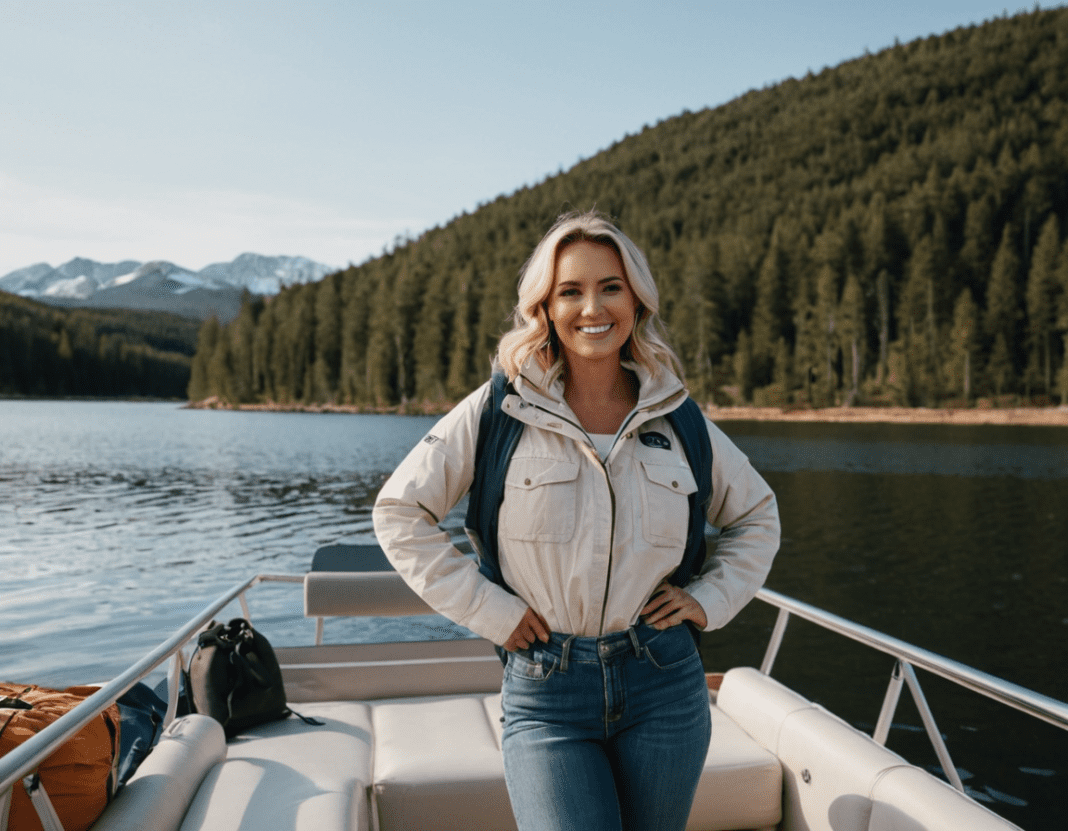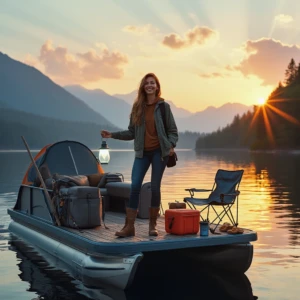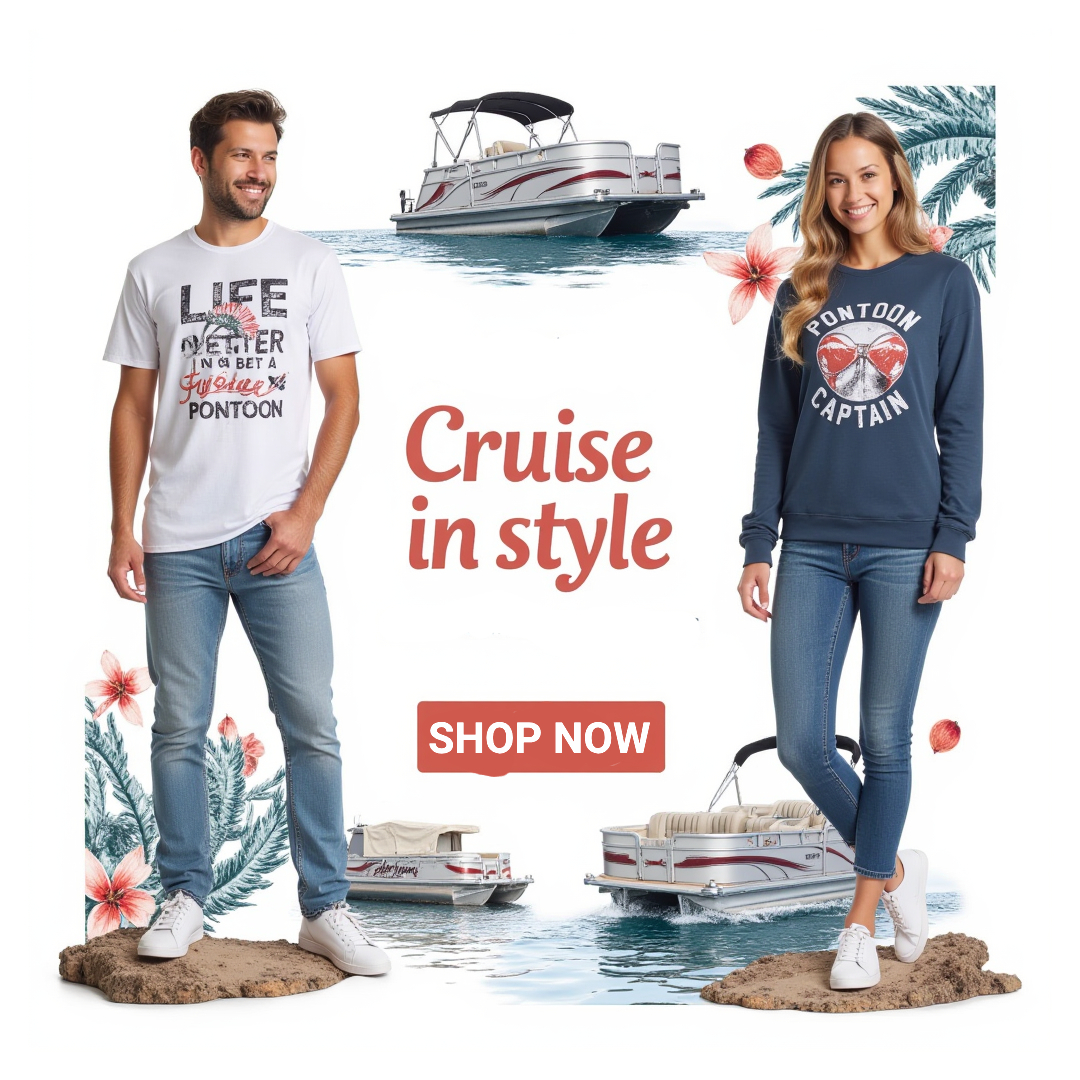Pontoon Boat Camping
Are you looking for a unique camping experience? Look no further than camping in a pontoon boat! This Ultimate Guide to Camping in a Pontoon Boat will provide you with all the information you need to have a fun and safe pontoon camping trip.
CaBasics of Pontoon Camping
Pontoon camping, also known as “boat camping,” involves setting up camp on a pontoon boat instead of a traditional camping ground. This type of camping allows for a unique and enjoyable experience surrounded by water.
Advantages of Choosing a Pontoon Boat for Camping
One of the biggest advantages of pontoon camping is the ability to escape crowded campgrounds and enjoy the peace and solitude of the water. Pontoon boats also provide several amenities, such as a kitchenette, bathroom, and sleeping areas, that make camping more comfortable and convenient.
Preparing for Your Adventure: What to Expect
Before embarking on your pontoon camping trip, it is essential to understand what to expect and prepare accordingly. You’ll need to pack lightly and efficiently, be prepared for inclement weather, and follow proper safety protocols.
Choosing the Right Pontoon Boat for Camping
Choosing the right pontoon boat for camping is crucial to ensure you have a comfortable and enjoyable experience. You want a boat that is spacious enough to accommodate your gear and fellow campers, while still being able to traverse the water with ease.
Key Features to Look for in a Camping-Friendly Pontoon Boat
When shopping for a pontoon boat for camping, look for features such as a large deck space, a comfortable seating area, and ample storage space for your gear. You may also want to look for a boat with a fully enclosed head or bathroom for added convenience.
Size and Capacity: Matching the Boat to Your Needs
Be sure to consider the size and capacity of the boat before making a purchase. If you plan on camping with a group, you’ll need a larger boat that can accommodate everyone. However, if you’re camping solo or with just one other person, a smaller boat may suffice.
Additional Amenities for Comfort and Convenience
Additional amenities to look for include a built-in grill or cooktop, a freshwater sink, and a sound system for entertainment. These features can enhance your camping experience and make it feel more like home.
Top Pontoon Boat Models Suitable for Camping
Some of the top pontoon boat models for camping include the Sylvan Mirage 8520 Party Fish LE, Harris Crowne SL 270, and the Bennington QX30.
When choosing a pontoon boat for camping, remember to look for features that will make your experience as comfortable and enjoyable as possible. Don’t be afraid to splurge on a boat with extra amenities or a larger size if it means a better camping experience.
Essential Gear and Modifications for Pontoon Camping
If you’re planning on going camping in a pontoon boat, you’ll need to make some modifications and bring the right gear to ensure a comfortable and safe trip. Here are some of the essential gear and modifications you’ll need:
Navigating Gear Storage Solutions
Storing gear on a pontoon boat can be a challenge, especially if you have a lot of equipment. Consider using storage containers that can be stowed under the seats or on the deck. You can also install rod holders, cup holders, and other accessories to keep gear organized and within reach.
Customizing Your Pontoon for Overnight Stays
If you plan on camping overnight, you’ll need to make some modifications to your pontoon boat to make it more comfortable. Consider adding a canopy or tent enclosure, as well as a portable toilet. You may also want to install additional lighting or fans to keep the cabin comfortable.
Must-Have Camping and Safety Equipment
- Lifejackets: Make sure you have enough lifejackets for everyone on board, and that they’re the appropriate size.
- Fire extinguisher: You should always have a fire extinguisher on board in case of emergencies.
- First aid kit: A well-stocked first aid kit is essential for any camping trip.
- Anchor: Make sure you have an anchor that’s appropriate for the size of your pontoon boat.
- GPS and maps: You should always have navigation tools on hand in case of emergencies.
Innovative Add-Ons and Tech for a Better Camping Experience
There are a variety of innovative add-ons and tech that can improve your camping experience on a pontoon boat. Consider adding a portable grill or stove, as well as a sound system to play music or audio books. You may also want to invest in solar panels or a portable generator to power your electronics.
Planning Your Pontoon Boat Camping Trip
Selecting the Best Locations for Pontoon Camping
When planning your pontoon boat camping trip, it is essential to select the best location. Several factors come into play when determining a suitable campsite. These factors include proximity to the water, privacy, and accessibility. You need to research and confirm whether the location allows camping and if the water permits boating activities.
It is essential to consider your safety when choosing a campsite location. Opt for campsites with low tides and minimal current conditions, especially if you are planning to camp with children. Avoid campsites with rough waters, strong winds, and high boat traffic. These conditions can result in accidents and make for an unpleasant boating experience.
Navigational Tips for a Smooth Camping Trip
Before setting out on your pontoon boat camping trip, it is crucial to understand the waterways and navigation requirements. Ensure you carry crucial navigation tools like GPS, a map, and a compass. It would help if you also familiarized yourself with waterway rules and regulations, including no-wake zones and speed limits.
During your camping trip, keep a keen eye on weather updates and potential hazards. Remember to carry a cell phone, VHF radio, or any other communication device for emergency situations. Make sure you coordinate with local marinas and fellow boaters to stay informed of any changes or updates in the waterways.
Creating a Camping Itinerary: Activities and Relaxation
A camping itinerary is essential in ensuring that you make the most of your pontoon boat camping trip. It will help you prioritize activities and make time for relaxation. Plan for activities like swimming, fishing, hiking, and kayaking. Incorporate time for family games, stargazing, and storytelling around the campfire.
Your itinerary should also include environmentally responsible practices. Ensure that you comply with leave-no-trace camping principles such as properly disposing of trash and packing out all of your waste. Leave your campsite cleaner than you found it.
Best Practices for Leave No Trace Camping
When camping on a pontoon boat, it is crucial to adhere to leave no trace principles. Respect the natural environment and preserve the natural beauty of the waterways. You can achieve this by following the below principles:
– Plan ahead and prepare: ensure that you have packed all the necessary supplies and leave behind all unnecessary items.
– Travel and camp on durable surfaces: steer clear of sensitive ecosystems and avoid pitching your tent near the water’s edge.
– Dispose of waste properly: pack out all trash, food leftovers, and litter. Dump waste only in designated locations or marinas.
– Leave what you find: avoid introducing new plants, animals, or insects to the waterways. Do not pick wildflowers or move rocks and other natural resources from their original habitat.
– Respect wildlife: keep a safe distance from animals and avoid feeding them.
| Topic | Key Data Points |
|---|---|
| Selecting the Best Locations for Pontoon Camping |
|
| Navigational Tips for a Smooth Camping Trip |
|
| Creating a Camping Itinerary: Activities and Relaxation |
|
| Best Practices for Leave No Trace Camping |
|
Safety and Etiquette While Camping on a Pontoon Boat
Prioritizing Safety: Essential Guidelines to Follow
When camping on a pontoon boat, safety should always be your top priority. Always have enough life jackets on board for every passenger, make sure all safety equipment is in good working order, and designate a responsible adult to be the captain at all times. Avoid alcohol or other impairments while operating or navigating the boat.
Environmental Considerations for Sustainable Camping
Pontoon boat camping can be an eco-friendly way to enjoy the outdoors. Be sure to pack your trash and dispose of it properly. Avoid polluting the water with chemicals such as soap or detergent. Respect the environment by not disturbing wildlife or plants and by adhering to all local regulations and wildlife protection laws.
Interacting with Wildlife and Respecting Nature
While camping on a pontoon boat, it’s essential to appreciate and respect the natural environment that you are in. Avoid feeding or interacting with wildlife as they can become dependent on human food and may become more aggressive. Respect quiet hours and avoid excessive noise that can disturb wildlife and other campers.
Respecting Fellow Campers and Boaters
As you would in any communal environment, always be respectful of your fellow campers and boaters. Keep your boat and campsite clean and tidy, follow posted rules and regulations, and be mindful of quiet hours. If you’re new to pontoon boat camping, be sure to observe and follow the boat etiquette rules. Yield to larger boats and maintain a safe distance from other vessels at all times.
Frequently Asked Questions
What should I bring for a safe pontoon boat camping trip?
Bring life jackets, a first aid kit, a fire extinguisher, and any other safety equipment recommended for your region. Don’t forget sunscreen, insect repellent, and other relevant personal items. Always stay hydrated and avoid alcohol or other impairments while navigating or operating the boat.
Can I camp anywhere on a pontoon boat?
No, you cannot camp anywhere on a pontoon boat. Observe local regulations and restrictions regarding camping locations while on the water. Many bodies of water have designated camping areas or specific regulations for overnight stays on boats.
Is pontoon boat camping safe for children?
With appropriate safety measures in place, pontoon boat camping can be a fun and safe family activity. Always ensure that children wear life jackets while on the boat and that they are supervised at all times when on or near the water.
Can I use my pontoon boat for watersports during a camping trip?
Yes, pontoon boats can be a great water sports platform during a camping trip. Ensure that you have the appropriate equipment and follow all safety guidelines and regulations associated with your chosen water sport. Remember, safety is always the top priority.














